#include<iostream> using std::cout; using std::endl; class Point{ public: Point(int x0=0,int y0=0); Point(const Point& p); ~Point()=default; int get_x() const{return x;} int get_y() const{return y;} void show() const; private: int x,y; }; Point::Point(int x0,int y0):x{x0},y{y0}{ cout <<"copy constructor called"<<endl; } Point ::Point(const Point& p):x{p.x},y{p.y} { cout <<"copy constructor called"<<endl; } void Point::show() const{ cout<<"("<<x<<","<<y<<")"<<endl; } int main() { Point p1(4, 5); p1.show(); Point p2 = p1; p2.show(); Point p3{p2}; p3.show(); cout << p3.get_x() << endl; }
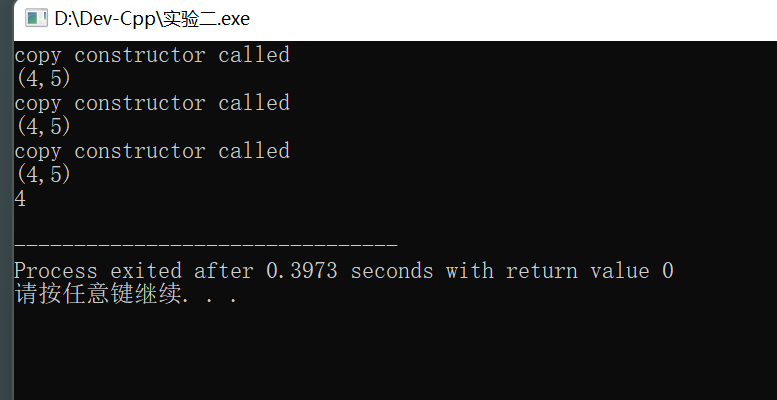
实验三
#include<iostream> #include<iomanip> using std::cout; using std::endl; class Clock{ public: Clock(int h=0,int m=0,int s=0); Clock(const Clock&t); ~Clock()=default; void set_time(int h,int m=0,int s=0); void show_time() const; private: int hour,minute,second; }; Clock::Clock(int h, int m, int s): hour{h}, minute{m}, second{s} { cout << "constructor called" << endl; } Clock::Clock(const Clock& t): hour{t.hour}, minute{t.minute},second{t.second} { cout << "copy constructor called" << endl; } void Clock::set_time(int h,int m,int s){ hour=h; minute=m; second=s; } void Clock::show_time()const{ using std::setw; using std::setfill; cout<<setfill('0')<<setw(2)<<hour<<":"<<setw(2)<<minute<<":"<<setw(2)<<second<<endl; } Clock reset(){ return Clock(0,0,0); } int main(){ Clock c1(12,0,5); c1.show_time(); c1=reset(); c1.show_time(); Clock c2(c1); c2.set_time(6); c2.show_time(); }
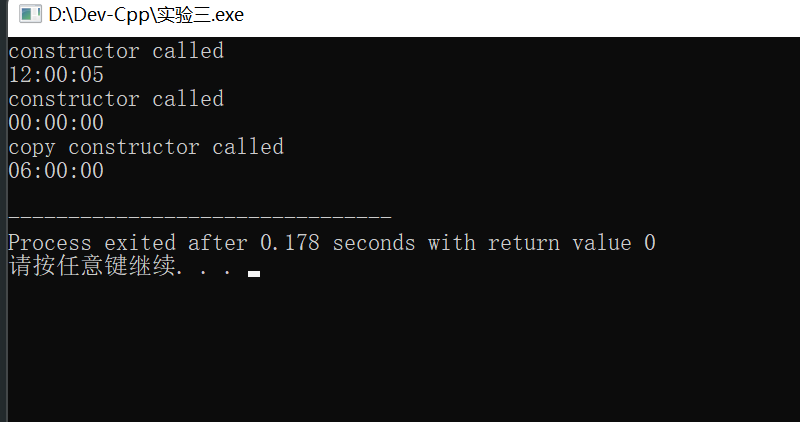
实验四
#include<iostream> class X{ public: X(); ~X(); X(int m); X(const X &obj); X(X&&obj)noexcept; void show() const; private: int data; }; X::X():data{42}{ std::cout<<"default constructor called.\n"; } X::~X(){ std::cout<<"destructor called.\n"; } X::X(int m):data{m}{ std::cout<<"constructor called.\n"; } X::X(const X& obj): data{obj.data} { std::cout << "copy constructor called.\n"; } X::X(X&& obj) noexcept: data{obj.data} { std::cout << "move constructor called.\n"; } void X::show()const{ std::cout<<data<<std::endl; } int main(){ X x1; x1.show(); X x2{1111}; x2.show(); X x3{x1}; x3.show(); X x4{std::move(x2) }; x4.show(); }
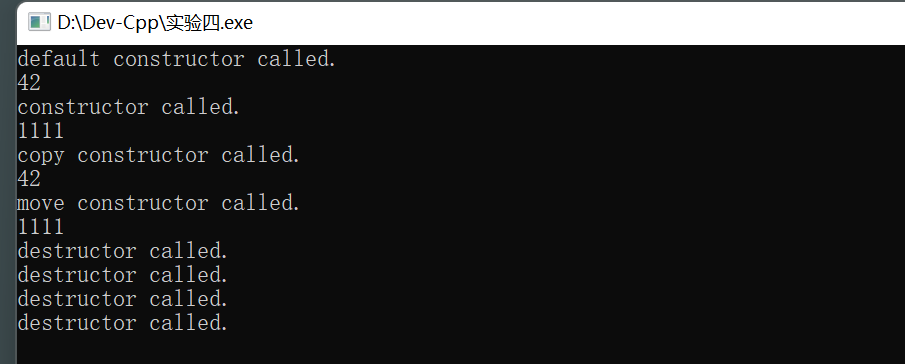
实验一
#include <iostream> #include <string> #include <vector> int main() { using namespace std; string s1; string s2{"c plus plus"}; string s3{s2}; string s4 = s2; s1 = "oop"; vector<string> v1; v1.push_back(s1); v1.push_back(s2 + "1"); v1.push_back(s3 + "2"); v1.push_back(s4 + "3"); cout << "output1: " << endl; for(auto item: v1) cout << item << endl; cout << "ouput2: "; for(auto p = v1.begin(); p != v1.end(); ++p) cout << *p << endl; cout << "output3: " << endl; for(auto i = 0; i < v1.size(); ++i) cout << v1[i] << endl; vector<string> v2{v1.rbegin(), v1.rend()}; cout << "v2: " << endl; for(auto item: v2) cout << item << endl; }
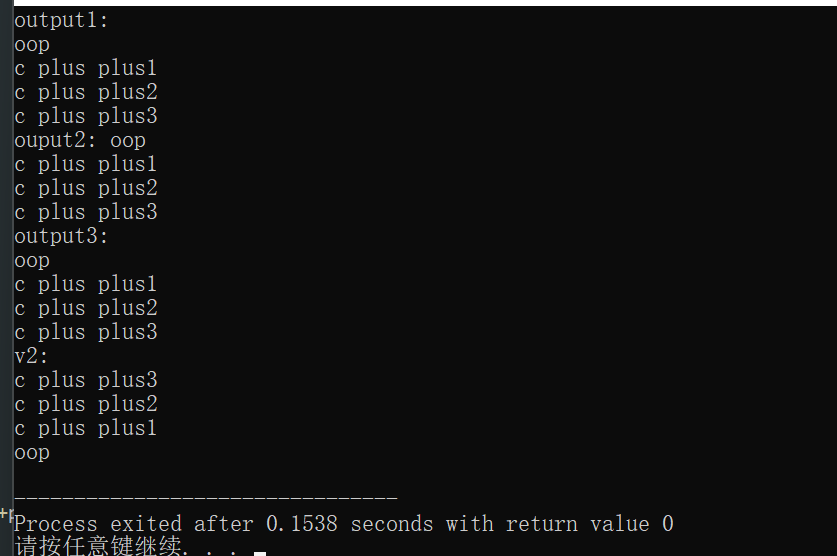
实验5
#include<iostream> #include<iomanip> using namespace std; class Rectangle { public: Rectangle(); //默认构造函数 Rectangle(float l, float w); //带有两个参数的构造函数 Rectangle(Rectangle& r); //复制构造函数 ~Rectangle() {};//析构函数 float len() { return length; } float wide() { return width; } float area() { float area = length * width; return area; } float circumference() { float cir = 2 * (length + width); return cir; } void resize(float times) { length *= times; width *= times; } void resize(float l_times, float w_times) { length *= l_times; width *= w_times; } private: float length, width; }; Rectangle::Rectangle() :length(2.0), width(1.0) { } Rectangle::Rectangle(float l, float w) : length(l), width(w) { } Rectangle::Rectangle(Rectangle& r) { length = r.length; width = r.width; } void output(Rectangle r) { cout << "矩形信息:\n"; cout << fixed << setprecision(2); cout << "长:" << r.len() << endl << "宽: " << r.wide()<<endl << "面积:" << r.area() << endl << "周长: " << r.circumference() << endl<<endl; } int main() { Rectangle rect1; output(rect1); Rectangle rect2(10.0, 5.0); output(rect2); Rectangle rect3(rect1); rect3.resize(2.0); output(rect3); rect3.resize(5.0, 2.0); output(rect3); }
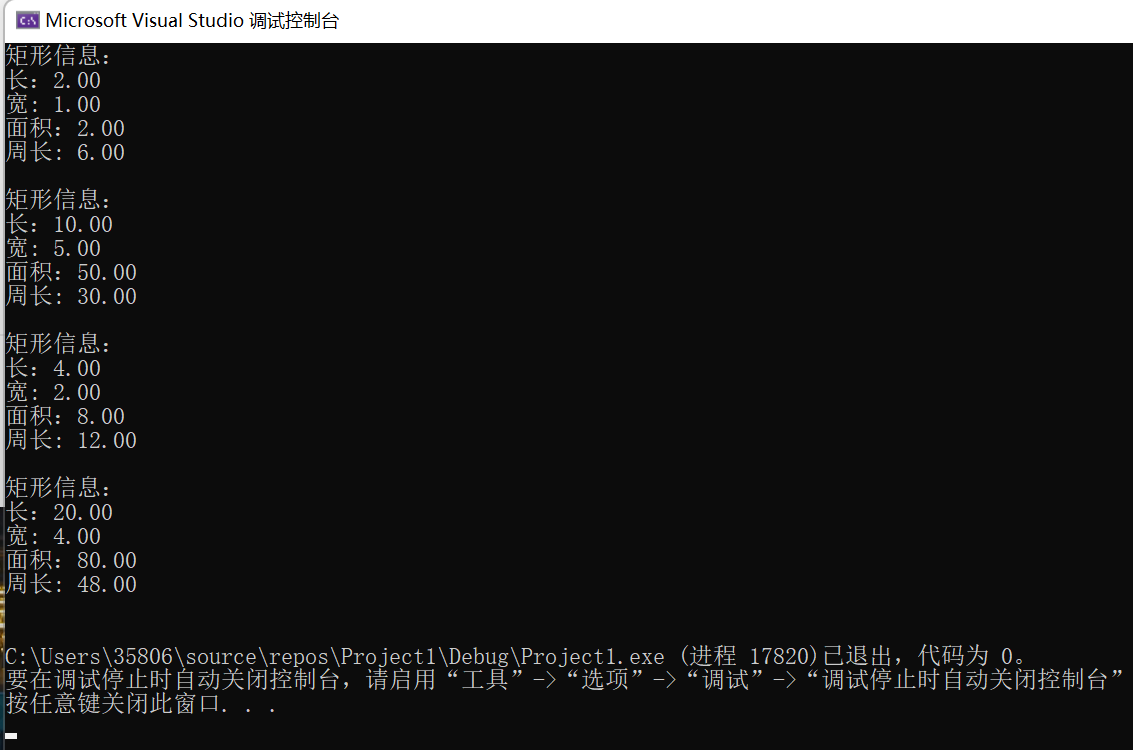


 posted on
posted on

